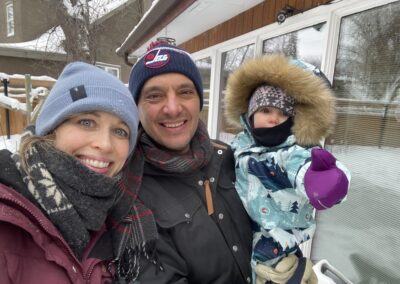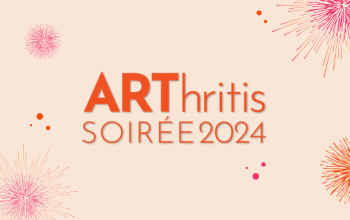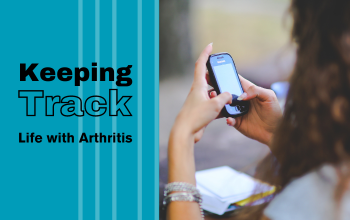Arthritis: A Journey You Can’t Prepare For
For Jennifer, it started with stiff hands in the morning and progressed to random tingles and throbs in toes, knees and fingers – strange enough to notice, but small enough to ignore.
Then came the all-consuming wave of fatigue, but that could be explained away too. Jennifer was a new mom, up in the night nursing a baby and not sleeping like she used to. It was also Christmas of 2021 and parents were raising kids in isolation, without family support, and in the throws of a global pandemic.
“I thought I was supposed to be tired,” she said. “I was experiencing a lot of ups and downs, really feeling the world’s stress and struggling to care for my daughter without a village.”
Jennifer waited a few months before reaching out to her family doctor and was diagnosed with postpartum depression, but knew something else was going on and pushed for a blood test.
“Everything came back normal, my RA Factor and CRP were normal” she said. “There was some evidence of anti-nuclear antibodies (ANA Test), but not positive enough for a diagnosis.”
Jennifer’s doctor referred her to a rheumatologist and, after more bloodwork, she tested positive for the HLA-B27 gene, which is common in people with certain types of arthritis and inflammatory diseases. An ultrasound also revealed inflammation in her hands and, 10 months after experiencing the first symptoms, Jennifer was diagnosed with rheumatoid arthritis.
“I was in denial,” she said. “I wondered what I did wrong. No one deserves this disease. I was so shocked, as I have been a very health-focused person all my life.” Jennifer questioned whether she stressed herself out too much, pushed her body too hard or experienced too much trauma. However, while she grappled with unknowns and was now facing living with a chronic disease, Jennifer had an 18-month-old to care for.

“I was struggling to keep up with my daughter and I was her primary caregiver,” she said. “I kept thinking I wanted to go back to work, but my body wouldn’t let me. And my body is literally my instrument.” As a performing artist and coach for creatives and artists, Jennifer’s job can be physical and involve long hours. She wondered if she’d ever be able to work again.
“I was in survival mode and all my energy was going towards taking care of my toddler.
Out of the Fog
In an attempt to get Jennifer’s inflammation under control, her rheumatologist prescribed hydroxychloroquine, a disease-modifying anti-rheumatic drug (DMARD). When that wasn’t enough, she was put on sulfasalazine, another DMARD. Jennifer also did a couple rounds of prednisone, but struggled with the side effects.
“Going on these serious medications was scary for me, as I can be quite sensitive to medication, so I had to choose to be brave,” she said. “Although it was pretty rough the first 3-6 weeks for me, I’m glad I went this route because the drugs gave me the space to feel better, have more energy and regain some control in my life.”
In June of 2023, Jennifer finally felt like the medication was working. “It’s like I have my life back, and saying that brings tears to my eyes,” she said. “I have so much relief and I’m out of survival mode.”
Not Out of the Woods
With her inflammation controlled, Jennifer worked on navigating life with a chronic disease. She enrolled her daughter in a part-time, outdoor preschool and slowly started doing more activities.
“I needed some alone time to process everything, and figure out how to weave work back in,” she said. “So, I started with taking walks outside, and did a lot of journaling, and I just let myself listen deeply to myself and slowly figure out the most sustainable way to move forward.”
Jennifer is now starting to audition for roles and hopes to be a regular on a TV show one day while also creating her own performance pieces too. “Being a performing artist is a huge part of my identity that I’ve been missing so much,” she said. “It’s definitely a calling. I don’t know who I’d be if I didn’t perform. It’s been almost 3 years that I’ve been off work now, so it’s a bit wobbly, but I’m ready be back.”
She’s also re-launching her coaching practise where she works with other artists to help them navigate their own creative paths. She just finished a new coaching certification this fall and is now working with a small number of clients. “I care deeply about creative people making their dreams happen, no matter the obstacle, and now I’m learning a whole new layer of perspective with what I’m going through.”
“I’ve learned that slow is best when you’re living with rheumatoid arthritis.” She admitted there is a certain level of uncertainty a person has to accept when living with arthritis. Flares, for example, amplify that uncertainty, bring out the worry and can cause her mental health to spiral.
“Flares are very triggering and depressing,” she said. “My brain fog can be brutal. It’s like mom brain x 100 and some days, I can’t string sentences together.” That’s when Jennifer starts to worry about the future – especially about the role she will be able to play in her daughter’s life as she grows up.
“It’s the worst when I’m looking at my daughter and she wants me to chase her, jump around or get silly and there’s no way I can do it. I look at her and feel sad and angry. What if this is my life now where I can’t keep up with my daughter and she has a mom that’s sick all the time? It brings up so much anticipatory grief. I wonder, what is my life going to be like?”
Flares also remind Jennifer of her time in survival mode. They make her think back to that first summer with rheumatoid arthritis when the family had to cancel all travel plans because she couldn’t handle the stress of being away from home or spending a lot of time in cars or on planes.
“There’s always this sneaky little fear inside me about whether I’m being the best parent for my kid. I know most parents in general have this fear, but it’s got an extra layer when you’re a parent with a chronic illness ” she said. “And if I’m not attentive to that fear, it’ll generalize into fears about all aspects of my life – and whether I’ll have to stop doing things I love to do, and how that’ll impact others, and so the spiral goes. Rheumatoid arthritis impacts everything.”
Seeing the Good in the Worst
Jennifer has learned to soak up the good days and be grateful for what she has. With more energy, she is starting to do more activities with her daughter.
“I want to add in those extra things I imagined doing with her before she was born. Dance parties in the kitchen, hide-and-seek, putting on puppet shows, skiing, camping trips… all the precious moments of childhood.”
Jennifer is more intentional with her time and cares less about saying no or cancelling plans. She prioritizes rest and is working on retiring her “type A” personality. She lets the house get messy and no longer cares about the world’s hustle culture.
“High-Achieving-Jen can no longer be the one steering the Jen Ship and that’s okay,” she said.
It may take a village to raise a child but it also takes a village to live with a chronic disease. Jennifer’s husband is her best friend and her biggest source of support.
“I don’t know if he will ever fully understand my experience, but he’s always there for me no matter what,” she said.
Jennifer also seeks support from friends and family, as well as people on social media who share their lives with rheumatoid arthritis. More than anything, she wants other people living with inflammatory arthritis to know that it can get better.
“There’s no crystal ball for my future, but there are a lot of medications, resources, and good people in this world doing work to help people live well with arthritis.”
Photo credit (left to right): Jennifer Pielak, Jon Major, Jennifer Pielak, Jennifer Pielak
The Gift of Arthritis Research
Receiving an arthritis diagnosis can be life-changing at any age. At Arthritis Research Canada, our scientists conduct practical research for everyday living – research to help people stay employed, maintain mental health, continue exercising and doing activities they enjoy, be present for their children and loved ones and so much more. We’ve put together a list of research and resources you may find helpful at the beginning of your arthritis journey, like Jennifer, or if you have been living with arthritis for years.
Employment: Experiencing difficulties at work due to symptoms like pain and fatigue? Our scientists have developed a one-of-a-kind, online program, called Making it Work™, to prevent work disability and foster healthy, productive work lives. Learn More
Mental Health: Feeling overwhelmed by life with arthritis? You’re not alone! People living with arthritis are more likely to experience symptoms of anxiety and depression. We’ve got research to help you prioritize your physical and mental health. Learn More
Self-Care: Stuck in survival mode? Finding balance after an arthritis diagnosis can be tough. However, in addition to medications, there are a lot of other things you can do to take control of your symptoms and life. From diet to exercise to finding balance and more, we’ve got your back. Learn More
Exercise: Unsure about what types of exercise will help or hinder your arthritis? Strength training has been tied to lower blood pressure and a reduced risk for type 2 diabetes, anxiety, depression and more. Discover I START, a unique guide created to help people with rheumatoid arthritis build strength training into their exercise routines. Learn More
Family Planning: Want to start a family? Worried about how your medications could impact you or your baby? We’re conducting research to examine the effect of arthritis medications on mom and baby during pregnancy and beyond. Learn More
Parenting: Struggling with parenting and arthritis? Want to discover what other parents with arthritis are dealing with? Our researchers examined Reddit threads to uncover parenting needs, concerns and challenges among women living with rheumatoid arthritis. Learn More
Sleep: Having trouble falling asleep, staying asleep or waking early? Lack of sleep is about more than being tired. It can worsen pain and fatigue and even amplify mental health problems. Our scientists are developing a unique sleep program specifically designed for people with arthritis. Learn More
More: Browse our current research to find out what other solutions and life-changing programs are in the pipeline for people with arthritis. Learn More






























































